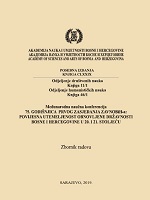RECEPCIJA AKSIOLOGIJE ZAVNOBIH-a U POSTDEJTONSKOJ BOSNI I HERCEGOVINI: DIVERGENTNO POIMANJE EMANCIPACIJSKE I LIBERTANSKE POLITIKE
RECEPTION OF AXIOLOGY OF ZAVNOBIH IN POST-DAYTON BOSNIA AND HERZEGOVINA: DIVERGENT UNDERSTANDING OF EMANCIPATION AND LIBERTARIAN POLITICS
Author(s): Elvis Fejzić
Subject(s): Politics, Political Philosophy, Government/Political systems
Published by: Akademija Nauka i Umjetnosti Bosne i Hercegovine
Keywords: Bosnia and Herzegovina; Democracy; Tolerance; Multiculturalism; Nation; Citizenship;
Summary/Abstract: Bosnian-Herzegovinian ethnocracy – as a hegemonic form of post-Dayton politics – represents a manifest threat to the politics of multiculturalism that is practiced in heterogeneous societies characterized by mixed racial, ethnic, religious, cultural and linguistic structures. Such politics rests on the political domination of recognized ethnic communities that, as a rule, majorize minority ethnic and civic groups in society through the politics of depersonalisation. Such politics minimizes the importance of the individual will of citizens in election process compared to the majority will of the dominant ethnic group. The ethnocratic regime has some features of pre-democratic governance, that relied, e.g., on the domination of the feudal-aristocratic elites that ruled without the consent and legitimacy of the people. In such regimes ordinary individuals were reduced to the level of merely submissive existence. Bearing this in mind, it should be emphasized that ethnocracy also reduces civil existence to the level of obedient existence, and can therefore be characterized as a disguised form of feudal aristocracy. In response to the destructive tendencies of ethnocratic politics, we have to affirm the emancipatory ideas of pluralistic democracy, civic representation, political equality and multiculturalism – in the Bosnian-Herzegovinian post-Dayton political discourse. Without it it is impossible to implement the requirements of authentic democracy under circumstances of multinational political existence. Only such a political approach can bring and assure Bosnia and Herzegovina a functional integration into the European Union, and this political scenario has no acceptable alternative. Internal political disagreements in Bosnia and Herzegovina should be resolved before the full fledged membership in the European Union – since any different development could have negative consequences – and because only in such a way the state can successfully overcome all political novelties that will be introduced through a complex integration process. First of all, it is necessary to achieve a basic consensus on the nature of the state, so that it will be accepted by all its citizens and peoples, but also in order to get a more efficient institutional mechanism. Implementation of political reforms – in the context of the restructuring of the state of Bosnia and Herzegovina – should not be separated from the basic values found in the historical fundamentals of Bosnia and Herzegovina political culture. These values have been established by a rich historical, political experience of Bosnia and Herzegovina and some political events such as, e.g., the activities of the Bosnian Autonomy Movement, armed resistance to Austro-Hungarian occupation, inter-war activities aimed at preserving territorial integrity, AVNOJʼs decision, decisions of ZAVNOBiH – and, finally, the referendum decision by citizens who voted in favour of an independent, sovereign and integral state of Bosnia and Herzegovina. Only on these political grounds – assuming that there is a majority support of citizens for such political program – could be possible to build a multicultural politics that would be acceptable to all Bosnian citizens and peoples.
- Page Range: 415-431
- Page Count: 17
- Publication Year: 2019
- Language: Bosnian
- Content File-PDF

